Best of 2014: Classical Concerts | reviews, news & interviews
Best of 2014: Classical Concerts
Best of 2014: Classical Concerts
A triumphant year for youth and pianism
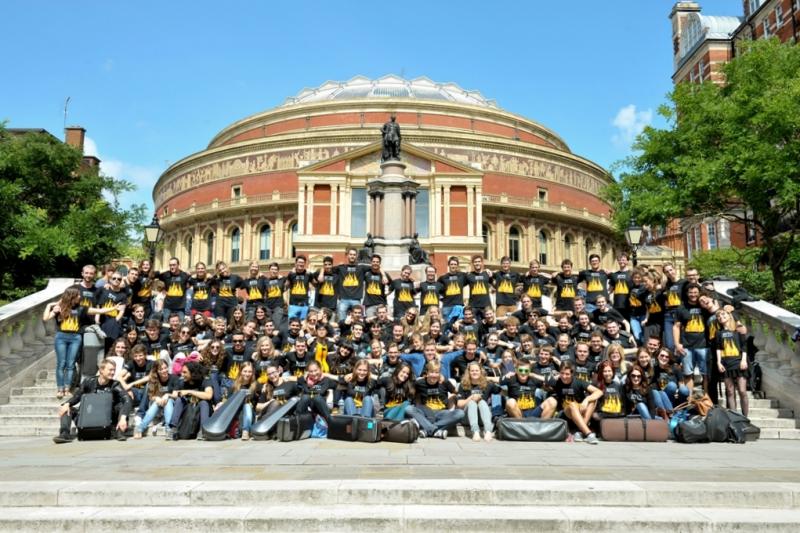
Offshoots of the Venezuelan El Sistema’s worldwide dissemination as well as other youth and music projects continued to bloom and grow in 2014. The morning after what was the orchestral concert of the year for many who caught it, Alexandra Coghlan (see below) and myself included, players of the European Union Youth Orchestra reconvened in the Albert Hall to workshop three classics with musicians from nine British youth orchestras and London schools.
How proud the EUYO's founding music director Claudio Abbado would have been of this ongoing good work (he died, as if we could forget, this year after a last decade of music-making that can never be surpassed). The mega youth orchestra's joyous performance of Ravel’s Bolero, maybe not the height of sophistication but culminating in a Sistema-like walkabout from the strings, trumped the one at the end of a bitty West-Eastern Divan Orchestra Prom under Barenboim.
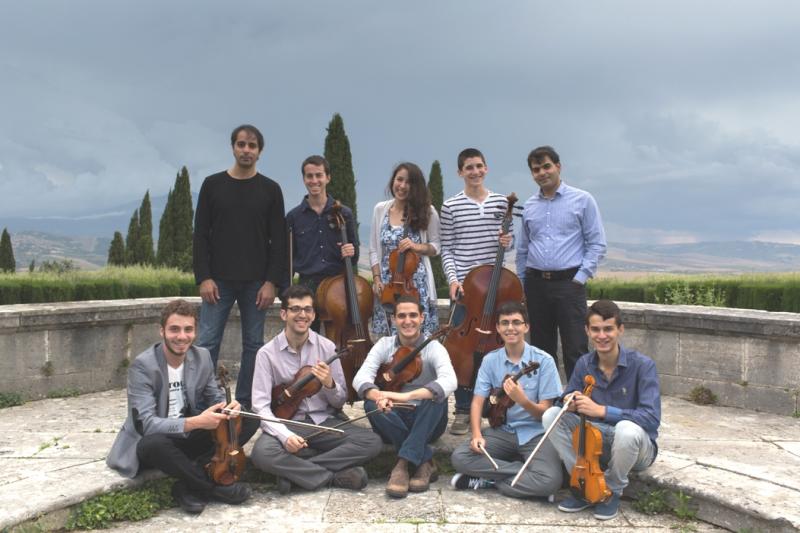 On which note, the most moving performance of the year for me was the coming together of Jewish and Palestinian Israelis in their teens, at a time of the highest tension in the land they’d just left behind, to play Haydn’s First String Quartet and an interpretation of Dvořák’s Piano Quintet superb by any standards, thanks to pianist Saleem Ashkar’s peerless lead. He and his brother Nabeel Abboud Ashkar, the driving force behind the Polyphony Foundation of Nazareth which made it all possible, were certainly the most inspiringly articulate musicians I met in 2014. I’m cheating slightly here because we're sticking to UK concerts for the top 10 and that event took place in a beautiful small 19th century theatre in the exquisite Umbrian town of Citta della Pieve as part of the Incontri di Terra di Siena Festival, but highlight it remains all the same (the Ashkars with the young Polyphony musicians pictured above at La Foce by Paul Flanagan). And whilst I'm touching on meaningful jaunts abroad, do read, if you haven't already, about the remarkable social experiment of Portugal's Setúbal Music Festival.
On which note, the most moving performance of the year for me was the coming together of Jewish and Palestinian Israelis in their teens, at a time of the highest tension in the land they’d just left behind, to play Haydn’s First String Quartet and an interpretation of Dvořák’s Piano Quintet superb by any standards, thanks to pianist Saleem Ashkar’s peerless lead. He and his brother Nabeel Abboud Ashkar, the driving force behind the Polyphony Foundation of Nazareth which made it all possible, were certainly the most inspiringly articulate musicians I met in 2014. I’m cheating slightly here because we're sticking to UK concerts for the top 10 and that event took place in a beautiful small 19th century theatre in the exquisite Umbrian town of Citta della Pieve as part of the Incontri di Terra di Siena Festival, but highlight it remains all the same (the Ashkars with the young Polyphony musicians pictured above at La Foce by Paul Flanagan). And whilst I'm touching on meaningful jaunts abroad, do read, if you haven't already, about the remarkable social experiment of Portugal's Setúbal Music Festival.
The influx of stunning younger generation soloists in every sphere only goes to contradict one necessary fiction of the critical fraternity, that there really can be a best, especially among pianists, when it's only possible to have different qualities at the same level. So my newcomer choice of the year below is only based on what I heard: whereas we were able to glean a fairly comprehensive picture of the operatic year in the UK, when London alone has at least six or seven top-notch concert choices to make every night, you can’t tell what you missed.
 I wish, for instance, I’d caught the Ibragimova/Osborne recital chosen by Jessica Duchen below, but I did hear Osborne stun in a Tippett retrospective of the Second and Third Piano Sonatas before the Heath Quartet’s revelation of the same composer’s late Fifth Quartet (the Heaths pictured above), and I also reeled at his partnership wih the equally unpredictable Alban Gerhardt at the Edinburgh Festival; both concerts would have made equally good choices. So I guess Osborne must be an artist of the year of sorts. Oh, and young audiences? The London Philharmonic seems to be attracting them in droves, and causing them to be the first to rise to their feet again and again, hopefully a knock-on effect of last year's The Rest Is Noise festival; other orchestras around the country are not doing so well.
I wish, for instance, I’d caught the Ibragimova/Osborne recital chosen by Jessica Duchen below, but I did hear Osborne stun in a Tippett retrospective of the Second and Third Piano Sonatas before the Heath Quartet’s revelation of the same composer’s late Fifth Quartet (the Heaths pictured above), and I also reeled at his partnership wih the equally unpredictable Alban Gerhardt at the Edinburgh Festival; both concerts would have made equally good choices. So I guess Osborne must be an artist of the year of sorts. Oh, and young audiences? The London Philharmonic seems to be attracting them in droves, and causing them to be the first to rise to their feet again and again, hopefully a knock-on effect of last year's The Rest Is Noise festival; other orchestras around the country are not doing so well.
Instead of trying to give an overall picture here, let me leave it to a top 10 listed in order of appearance over the year which inspired some of the team (several writers passed on “best concert”). Contributors here are Alexandra Coghlan, Jessica Duchen, Phil Radcliffe and myself.
Håkan Hardenberger and John Storgårds swap roles, Manchester
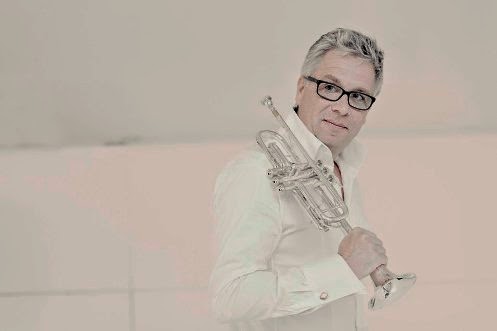 Picking a plum out of the BBC Philharmonic Orchestra’s many fine offerings at Manchester's Bridgewater Hall, I would choose the remarkable double act of their Principal Guest Conductor – also a fine violinist – John Storgårds, and his friend, the trumpeter Håkan Hardenberger (pictured right by Marco Borggreve).
Picking a plum out of the BBC Philharmonic Orchestra’s many fine offerings at Manchester's Bridgewater Hall, I would choose the remarkable double act of their Principal Guest Conductor – also a fine violinist – John Storgårds, and his friend, the trumpeter Håkan Hardenberger (pictured right by Marco Borggreve).
They took it in turns to conduct the orchestra and to perform two UK premières of Nordic works. Firstly, Storgårds took to the solo spot for a violin concerto by fellow countryman Kimmo Hakola, which envisages the violin soaring like an eagle above the maelstrom. He had to fight for his place before arriving at a mercurial cadenza. Then, changing places, Hardenberger took on a piece specially written for him by fellow-Swede Tobias Boström, the Lucernaris Concerto for Trumpet, Live Electronics and Orchestra. It proved to be a rare treat, not only for Hardenberger’s brilliance, but also for the theatricality of the staging. Since Lucernaris alludes to a Catholic lamp-lighting ceremony, the work calls for dramatic stage lighting, with the orchestra bathed alternately in red and blue. I’ve heard some impressive double acts in my time, but the Storgårds/Hardenberger combination is certainly one to remember. PR
Ilyich Rivas makes his debut with the LPO, Royal Festival Hall
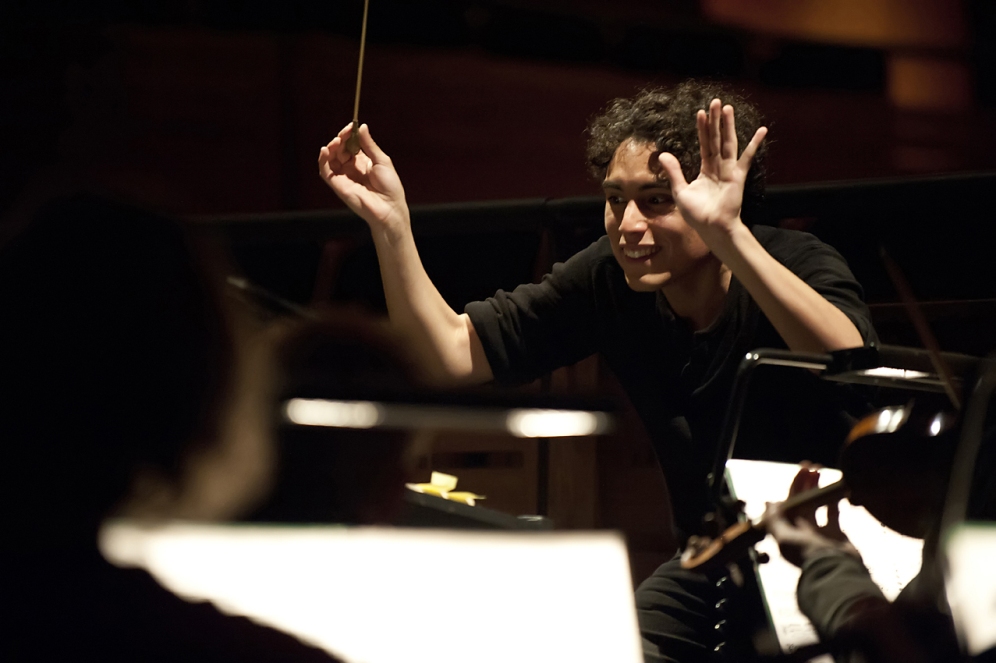 Interest declared: I’m married to a member of the London Philharmonic Orchestra, so I try not to write about them unless absolutely necessary. Right now, it is. This year the orchestra hosted the London debut of a 20-year-old conductor from Venezuela, Ilyich Rivas (pictured left) – and this was a concert so fresh,inspiring and enlivening that I felt it was a crucial highlight of 2014. Rivas – who incidentally is not a product of El Sistema, but has been studying for years in the US – jogged on to the platform and gave an excellently-chosen programme of Dvořák, Tchaikovsky, Mahler (the “Blumine” movement discarded from the First Symphony) and Shostakovich’s First Symphony, the latter work slaloming around the players with visceral rhythmic sense. Rivas enjoyed a particularly heartwarming rapport with his soloist in the Tchaikovsky First Piano Concerto, Simon Trpceski, who made a touching speech about the joys of working with Rivas and seeing his potential coming to fruition. Let’s hope he’ll be back soon. JD
Interest declared: I’m married to a member of the London Philharmonic Orchestra, so I try not to write about them unless absolutely necessary. Right now, it is. This year the orchestra hosted the London debut of a 20-year-old conductor from Venezuela, Ilyich Rivas (pictured left) – and this was a concert so fresh,inspiring and enlivening that I felt it was a crucial highlight of 2014. Rivas – who incidentally is not a product of El Sistema, but has been studying for years in the US – jogged on to the platform and gave an excellently-chosen programme of Dvořák, Tchaikovsky, Mahler (the “Blumine” movement discarded from the First Symphony) and Shostakovich’s First Symphony, the latter work slaloming around the players with visceral rhythmic sense. Rivas enjoyed a particularly heartwarming rapport with his soloist in the Tchaikovsky First Piano Concerto, Simon Trpceski, who made a touching speech about the joys of working with Rivas and seeing his potential coming to fruition. Let’s hope he’ll be back soon. JD
David Kadouch, Institut Français
 Co-ordinator of the French Institute’s “It’s All About Piano!” festival Françoise Clerc and I had both been bowled over by Kadouch’s role in a spellbinding Barbican performance of Poulenc’s Concerto for Two Pianos (Kadouch pictured right). She promptly engaged him for her weekend, and although I didn’t attend every concert, I boldly ventured that the 28-year-old Frenchman’s recital simply as perfect programming wouldn’t be excelled – ever. Even as interpretation the only thing I heard to match it all year were Steven Osborne’s Tippett and grand master Nikolay Lugansky’s total command of Rachmaninov’s 13 Op. 32 Preludes. But this was a more daring whole – from an early Bach Capriccio via Schumann to Janáček and Bartók, and all on a piano that had clearly seen better days; a great performer’s alchemy made that matter not a jot. DN
Co-ordinator of the French Institute’s “It’s All About Piano!” festival Françoise Clerc and I had both been bowled over by Kadouch’s role in a spellbinding Barbican performance of Poulenc’s Concerto for Two Pianos (Kadouch pictured right). She promptly engaged him for her weekend, and although I didn’t attend every concert, I boldly ventured that the 28-year-old Frenchman’s recital simply as perfect programming wouldn’t be excelled – ever. Even as interpretation the only thing I heard to match it all year were Steven Osborne’s Tippett and grand master Nikolay Lugansky’s total command of Rachmaninov’s 13 Op. 32 Preludes. But this was a more daring whole – from an early Bach Capriccio via Schumann to Janáček and Bartók, and all on a piano that had clearly seen better days; a great performer’s alchemy made that matter not a jot. DN
Alina Ibragimova and Steven Osborne, Wigmore Hall
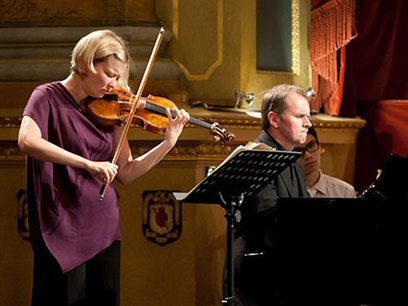 A violin and piano dream-team and a cool Franco-Russian-Baltic programme that brought together Debussy, Pärt and Prokofiev: this was a peerless recital on every level. Ibragimova and Osborne (pictured left) sounded like musical soulmates, alert to all this music’s vivid atmospheres, absolutely living the ineffable subtleties of the Debussy as well as the force and grace of Prokofiev’s rhythms. They caught the perfect balance of unity and individualism, matching intelligence and perceptiveness quality for quality; and together they are irresistibly charismatic as performers to boot. Anyone who suspects that a violin and a piano are no match for a full orchestra in terms of sound variety should listen to them and think again. JD
A violin and piano dream-team and a cool Franco-Russian-Baltic programme that brought together Debussy, Pärt and Prokofiev: this was a peerless recital on every level. Ibragimova and Osborne (pictured left) sounded like musical soulmates, alert to all this music’s vivid atmospheres, absolutely living the ineffable subtleties of the Debussy as well as the force and grace of Prokofiev’s rhythms. They caught the perfect balance of unity and individualism, matching intelligence and perceptiveness quality for quality; and together they are irresistibly charismatic as performers to boot. Anyone who suspects that a violin and a piano are no match for a full orchestra in terms of sound variety should listen to them and think again. JD
All-day Schubertiad, East Neuk Festival
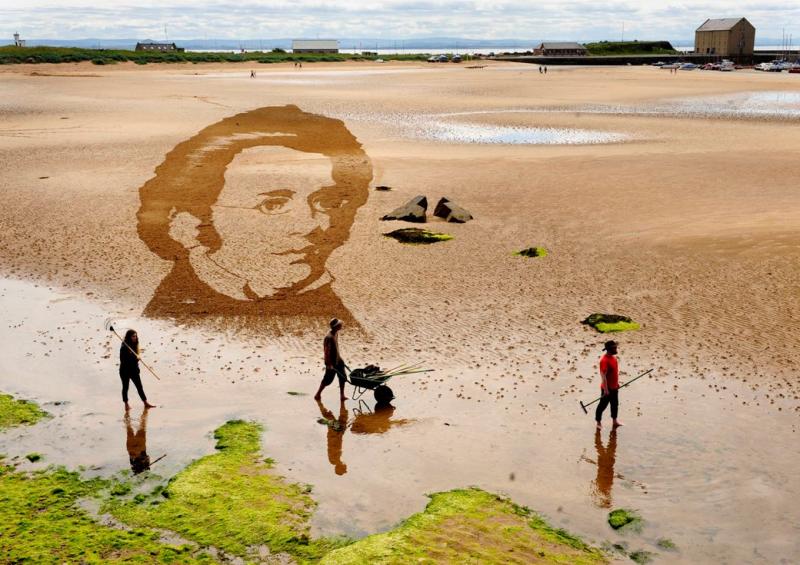 At least three of the six concerts realising East Neuk Festival director Svend Brown's dream of a proper Schubert celebration would have been up for top 10 honours here: the chords of tenderest, weepy Schubertian emotion were struck especially by the Belcea Quartet's bittersweet "Rosamunde", Llŷr Williams playing the D899 Impromptus as a through-conceived sequence and great Christian Zacharias's crowning glory of the ultimate Piano Sonata, D960. But the thing was the whole adventure, from the minute I arrived at Crail Church breathless after a longer-than-expected morning Fife coastal path walk from my lodgings in Cambo House to the endgame on a beautiful summer evening. Not to forget fish and chips in a garden by the sea. This was the ENF's 10th anniversary. It celebrated in style and with the best artists available; I can't end without mentioning the Scottish Chamber Orchestra delivering an airy Sibelius Seventh Symphony in a working potato barn with near-ideal acoustics. The festival also has to take the award for best publicity shot of the year; by Colin Hattersley of local team Sand In Your Eye's beach art; I make no excuse for reproducing it again above. DN
At least three of the six concerts realising East Neuk Festival director Svend Brown's dream of a proper Schubert celebration would have been up for top 10 honours here: the chords of tenderest, weepy Schubertian emotion were struck especially by the Belcea Quartet's bittersweet "Rosamunde", Llŷr Williams playing the D899 Impromptus as a through-conceived sequence and great Christian Zacharias's crowning glory of the ultimate Piano Sonata, D960. But the thing was the whole adventure, from the minute I arrived at Crail Church breathless after a longer-than-expected morning Fife coastal path walk from my lodgings in Cambo House to the endgame on a beautiful summer evening. Not to forget fish and chips in a garden by the sea. This was the ENF's 10th anniversary. It celebrated in style and with the best artists available; I can't end without mentioning the Scottish Chamber Orchestra delivering an airy Sibelius Seventh Symphony in a working potato barn with near-ideal acoustics. The festival also has to take the award for best publicity shot of the year; by Colin Hattersley of local team Sand In Your Eye's beach art; I make no excuse for reproducing it again above. DN
Borusan Istanbul Philharmonic Orchestra, BBC Proms
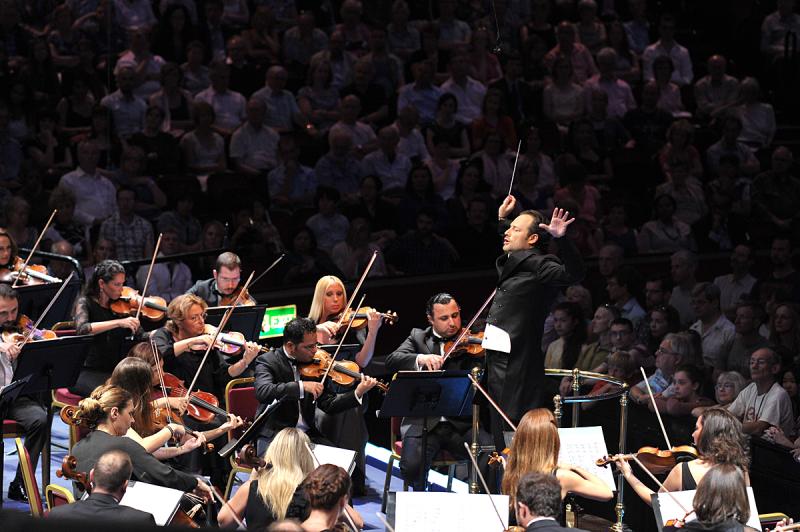
EUYO in Berio and Shostakovich, BBC Proms
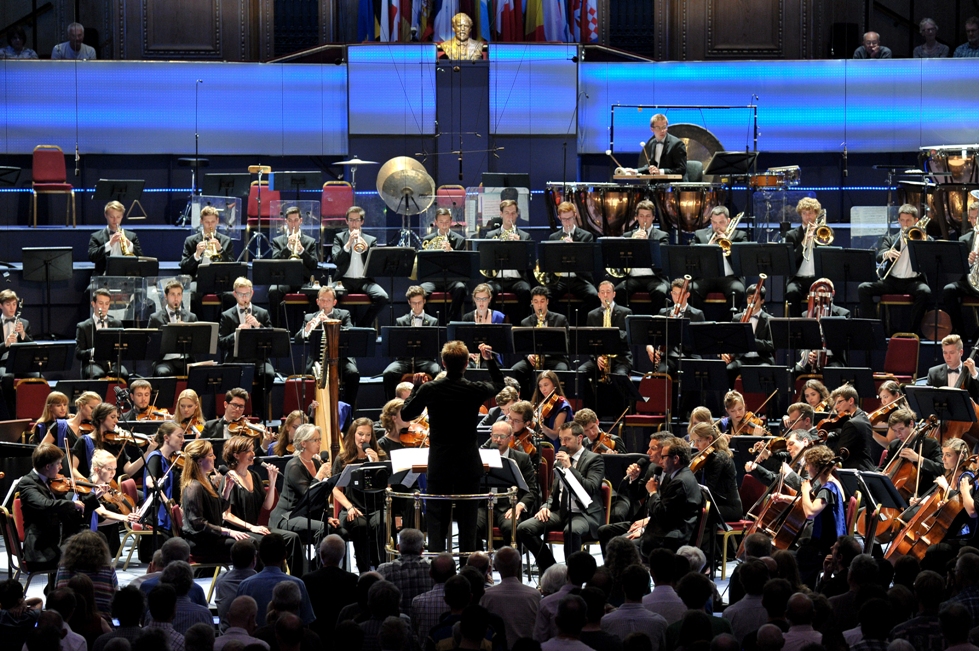
There’s something about the Proms and the Royal Albert Hall that can gild a fine performance, take it to that next level of intensity, thanks to the massed crowds and unusual layout. This was certainly the case with this year’s visit from the European Union Youth Orchestra (pictured above in their Prom by Chris Christodoulou). Performing under Vasily Petrenko, they offered an intriguing programme that paired Berio’s Sinfonia with Shostakovich’s Fourth Symphony, and the effect was thrilling. Passion and energy are a cliché of youth-orchestra playing, but what we had here (though both passionate and energetic) was tempered by an intelligence and a sense of collective purpose that refined them to something even finer. AC
Berlin Bach St Matthew Passion, BBC Proms
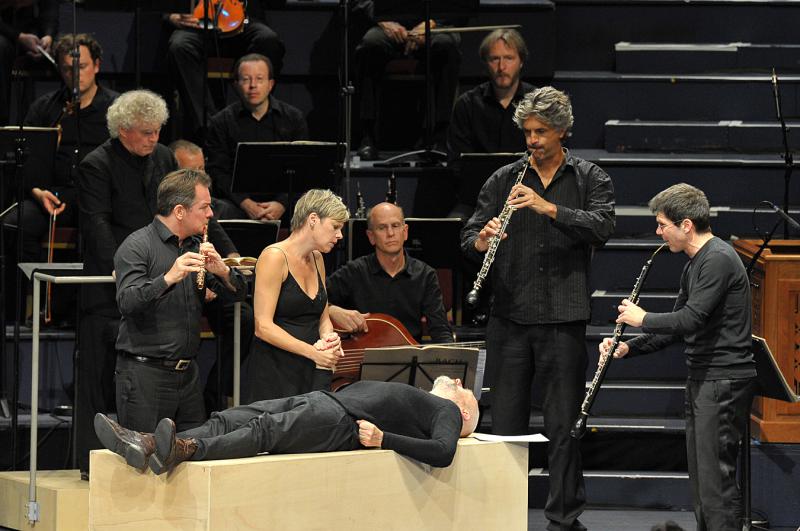
Elisabeth Leonskaja's epic Brahms, Edinburgh
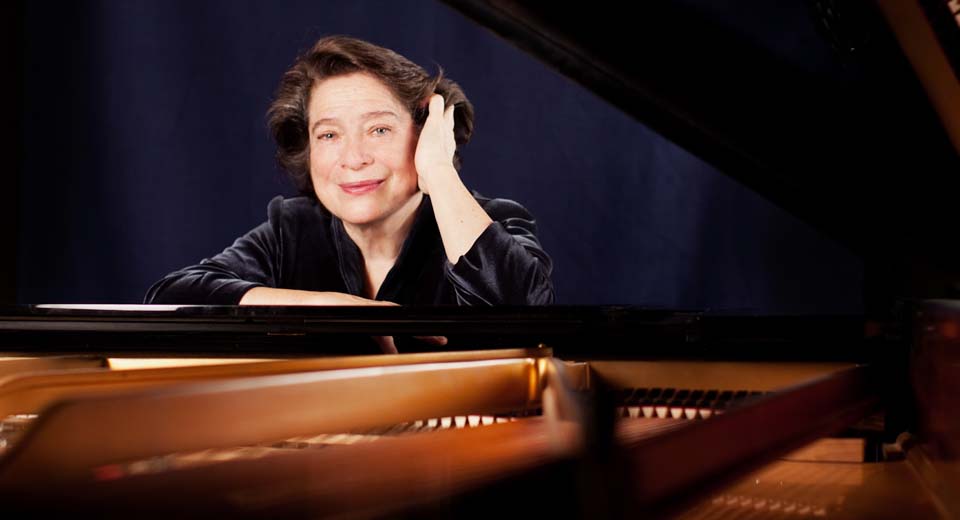 The nearest thing left on this planet to one who was definitely the greatest, Sviatoslav Richter, is his acolyte and sometime duo partner Elisabeth Leonskaja. Having witnessed with wonder four concerts in her Schubert sonatas marathon at the Verbier Festival, I was not surprised when, several weeks after a typically magisterial Wigmore lunchtime recital, she took on Brahms's two lyric-epic Piano Concertos in a single concert, only delighted that Scottish Chamber Orchestra management had shown the vision to say yes to her request. The partnership with a fine Finnish conductor too long absent from the western concert scene, Okko Kamu, was a miracle of cohesion and chamber-musical balance, with the SCO woodwind and star solo horn Alec Frank-Gemmill given space to breathe alongside Leonskaja's easy, rolling mastery from brilliant double octaves to the most hallowed, exquisitely phrased pianissimi. Some readers seem to have been more convinced by the Second Concerto than the First, but I bought it all and found the whole thing compelling from first note to last. Oh, and happy 40th birthday to my favourite chamber orchestra. DN
The nearest thing left on this planet to one who was definitely the greatest, Sviatoslav Richter, is his acolyte and sometime duo partner Elisabeth Leonskaja. Having witnessed with wonder four concerts in her Schubert sonatas marathon at the Verbier Festival, I was not surprised when, several weeks after a typically magisterial Wigmore lunchtime recital, she took on Brahms's two lyric-epic Piano Concertos in a single concert, only delighted that Scottish Chamber Orchestra management had shown the vision to say yes to her request. The partnership with a fine Finnish conductor too long absent from the western concert scene, Okko Kamu, was a miracle of cohesion and chamber-musical balance, with the SCO woodwind and star solo horn Alec Frank-Gemmill given space to breathe alongside Leonskaja's easy, rolling mastery from brilliant double octaves to the most hallowed, exquisitely phrased pianissimi. Some readers seem to have been more convinced by the Second Concerto than the First, but I bought it all and found the whole thing compelling from first note to last. Oh, and happy 40th birthday to my favourite chamber orchestra. DN
Sakari Oramo and Garrick Ohlsson champion a monster rarity, Barbican
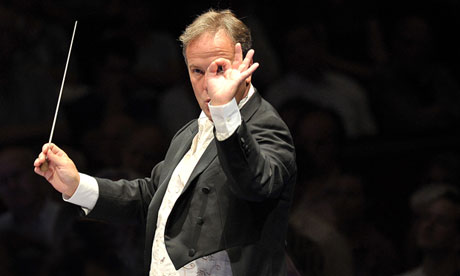 Never make a list until the last concert of the year has taken place. That was the lesson of a concert in which I was anticipating most eagerly Nielsen's Second Symphony, the "Four Temperaments", as part of Sakari Oramo's season-long Nielsen cycle with his BBC Symphony Orchestra (we celebrated the composer's 150th birthday alongside Sibelius's next year). In any other evening, that would have been the highlight, and its lively muscle had the most vivid of realisations. But the rarity was the 80 or so minute long turn-of-the-century Piano Concerto by inspired German-Tuscan maverick Ferruccio Busoni. It hadn't been heard in a major London venue since 1988, perhaps because only a pianist of supreme transcendental technique and stamina such as Garrick Ohlsson can do it justice.Not only he but also Oramo (pictured above by Chris Christodoulou) and the orchestra absolutely did, sending everyone I spoke to out on a high. Definitely one to repeat at the Proms – and don't miss the next instalments in the Nielsen series. DN
Never make a list until the last concert of the year has taken place. That was the lesson of a concert in which I was anticipating most eagerly Nielsen's Second Symphony, the "Four Temperaments", as part of Sakari Oramo's season-long Nielsen cycle with his BBC Symphony Orchestra (we celebrated the composer's 150th birthday alongside Sibelius's next year). In any other evening, that would have been the highlight, and its lively muscle had the most vivid of realisations. But the rarity was the 80 or so minute long turn-of-the-century Piano Concerto by inspired German-Tuscan maverick Ferruccio Busoni. It hadn't been heard in a major London venue since 1988, perhaps because only a pianist of supreme transcendental technique and stamina such as Garrick Ohlsson can do it justice.Not only he but also Oramo (pictured above by Chris Christodoulou) and the orchestra absolutely did, sending everyone I spoke to out on a high. Definitely one to repeat at the Proms – and don't miss the next instalments in the Nielsen series. DN
- For opera in concert, see our operatic Best of 2014
- David Nice's blog on the EUYO at the Albert Hall and its remarkable Europe Day concert in St John's Smith Square
Explore topics
Share this article
The future of Arts Journalism
You can stop theartsdesk.com closing!
We urgently need financing to survive. Our fundraising drive has thus far raised £49,000 but we need to reach £100,000 or we will be forced to close. Please contribute here: https://gofund.me/c3f6033d
And if you can forward this information to anyone who might assist, we’d be grateful.

Subscribe to theartsdesk.com
Thank you for continuing to read our work on theartsdesk.com. For unlimited access to every article in its entirety, including our archive of more than 15,000 pieces, we're asking for £5 per month or £40 per year. We feel it's a very good deal, and hope you do too.
To take a subscription now simply click here.
And if you're looking for that extra gift for a friend or family member, why not treat them to a theartsdesk.com gift subscription?
more Classical music
 Kilsby, Parkes, Sinfonia of London, Wilson, Barbican review - string things zing and sing in expert hands
British masterpieces for strings plus other-worldly tenor and horn - and a muscular rarity
Kilsby, Parkes, Sinfonia of London, Wilson, Barbican review - string things zing and sing in expert hands
British masterpieces for strings plus other-worldly tenor and horn - and a muscular rarity
 From Historical to Hip-Hop, Classically Black Music Festival, Kings Place review - a cluster of impressive stars for the future
From quasi-Mozartian elegance to the gritty humour of a kitchen inspection
From Historical to Hip-Hop, Classically Black Music Festival, Kings Place review - a cluster of impressive stars for the future
From quasi-Mozartian elegance to the gritty humour of a kitchen inspection
 Shibe, LSO, Adès, Barbican review - gaudy and glorious new music alongside serene Sibelius
Adès’s passion makes persuasive case for the music he loves, both new and old
Shibe, LSO, Adès, Barbican review - gaudy and glorious new music alongside serene Sibelius
Adès’s passion makes persuasive case for the music he loves, both new and old
 Anja Mittermüller, Richard Fu, Wigmore Hall review - a glorious hall debut
The Austrian mezzo shines - at the age of 22
Anja Mittermüller, Richard Fu, Wigmore Hall review - a glorious hall debut
The Austrian mezzo shines - at the age of 22
 First Person: clarinettist Oliver Pashley on the new horizons of The Hermes Experiment's latest album
Compositions by members of this unusual quartet feature for the first time
First Person: clarinettist Oliver Pashley on the new horizons of The Hermes Experiment's latest album
Compositions by members of this unusual quartet feature for the first time
 Gesualdo Passione, Les Arts Florissants, Amala Dior Company, Barbican review - inspired collaboration excavates the music's humanity
At times it was like watching an anarchic religious procession
Gesualdo Passione, Les Arts Florissants, Amala Dior Company, Barbican review - inspired collaboration excavates the music's humanity
At times it was like watching an anarchic religious procession
 Classical CDs: Camels, concrete and cabaret
An influential American composer's 90th birthday box, plus British piano concertos and a father-and-son duo
Classical CDs: Camels, concrete and cabaret
An influential American composer's 90th birthday box, plus British piano concertos and a father-and-son duo
 Cockerham, Manchester Camerata, Sheen, Martin Harris Centre, Manchester review - re-enacting the dawn of modernism
Two UK premieres added to three miniatures from a seminal event of January 1914
Cockerham, Manchester Camerata, Sheen, Martin Harris Centre, Manchester review - re-enacting the dawn of modernism
Two UK premieres added to three miniatures from a seminal event of January 1914
 Kempf, Brno Philharmonic, Davies, Bridgewater Hall, Manchester review - European tradition meets American jazz
Bouncing Czechs enjoy their Gershwin and Brubeck alongside Janáček and Dvořák
Kempf, Brno Philharmonic, Davies, Bridgewater Hall, Manchester review - European tradition meets American jazz
Bouncing Czechs enjoy their Gershwin and Brubeck alongside Janáček and Dvořák
 Solomon, OAE, Butt, QEH review - daft Biblical whitewashing with great choruses
Even a top soprano and mezzo can’t make this Handel paean wholly convincing
Solomon, OAE, Butt, QEH review - daft Biblical whitewashing with great choruses
Even a top soprano and mezzo can’t make this Handel paean wholly convincing
 Two-Piano Gala, Kings Place review - shining constellations
London Piano Festival curators and illustrious friends entertain and enlighten
Two-Piano Gala, Kings Place review - shining constellations
London Piano Festival curators and illustrious friends entertain and enlighten
 Echo Vocal Ensemble, Latto, Union Chapel review - eclectic choral programme garlanded with dance
Beautiful singing at the heart of an imaginative and stylistically varied concert
Echo Vocal Ensemble, Latto, Union Chapel review - eclectic choral programme garlanded with dance
Beautiful singing at the heart of an imaginative and stylistically varied concert

Add comment